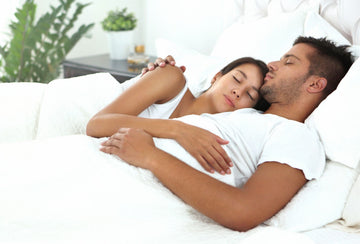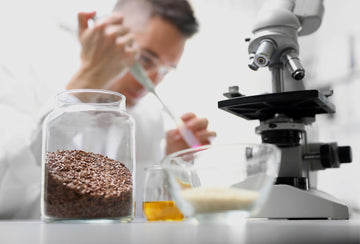You're lying peacefully in bed – but your body? It's running at full speed in the background. While you sleep, energy isn't simply conserved. Your immune system is trained, memories are organized, and repair processes are initiated. Sleep isn't a luxury, but an essential prerequisite for health, performance, and well-being.
But how much sleep do we actually need? Why is it so important—and do men sleep differently than women? In this article, you'll learn what really happens inside you at night.
How much sleep do you need – and why?
Sleep needs: Not the same for everyone
Most adults need an average of 7–9 hours of sleep per night. However, sleep varies from person to person. Some feel refreshed with 6 hours, others need 10. The National Sleep Foundation recommends:
- Children (6–13 years): 9–11 hours
- Teenagers (14–17 years): 8–10 hours
- Adults (18–64 years): 7–9 hours
- Seniors (65+): 7–8 hours
Those who regularly lack sleep risk long-term effects – on their immune system, metabolism and mental performance.
The sleep phases – a nightly rhythm in cycles
Sleep occurs in several cycles, each lasting approximately 90 minutes. Each cycle consists of different phases with specific functions:
- Falling asleep phase (N1): Transition from wakefulness – muscles relax, thoughts slow down.
- Light sleep phase (N2): Pulse and breathing slow down, consciousness decreases.
- Deep sleep phase (N3): Cell repair, hormone production and regeneration are running at full speed.
- REM sleep: dream phase with intense brain activity – important for emotions and memory.
Sleep is a state of profound physical and mental activity. While we appear to be resting, highly complex processes are taking place within us that are crucial to our health, performance, and even our emotional balance. Here's a closer look at the key mechanisms:
What happens during sleep – and why is it so important?
1. Cell repair & growth
During deep sleep, the growth hormone somatotropin (HGH) is released—especially in the first few hours after falling asleep. This hormone promotes:
· Cell regeneration: Damaged cells are repaired and new ones are built.
· Tissue growth: Particularly important for muscles, skin and bones.
· Wound healing and regeneration after physical exertion: Athletes or sick people have an increased need for deep sleep.
Lack of sleep can disrupt these processes, which in the long term accelerates skin aging, reduces muscle performance, and impairs overall well-being.
2. Immune training
During sleep, the immune system is regulated and activated. The following processes occur:
· Production of immune cells: T cells and natural killer cells in particular are produced in increased numbers.
· Cytokine release: These messenger substances control inflammatory reactions and are released in greater quantities at night.
· Strengthening “immune memory”: New information about pathogens is stored, making vaccinations more effective.
People with chronic sleep deprivation are proven to be more susceptible to infections, such as colds or flu.
3. Brain cleansing through the glymphatic system
During the day, the brain's high activity produces a multitude of metabolic waste products. These are removed at night through the glymphatic system —a kind of cleansing channel along the blood vessels.
· Beta-amyloid and tau proteins , which are associated with Alzheimer's disease, are removed.
· During deep sleep, brain cells shrink slightly, creating more space for the drainage of “waste products.”
This system only functions effectively with sufficient, undisturbed sleep – a possible reason why chronic sleep deprivation is associated with an increased risk of neurodegenerative diseases.
4. Order in the head: memory & emotions
During sleep, our memory is organized and stabilized. Depending on the phase of sleep, different things happen:
· Deep sleep (non-REM): This is where facts, vocabulary and motor learning are transferred into long-term memory.
· REM sleep: This is more about emotional content, personal experiences, and creative connections.
In addition, our “emotional balance” is readjusted at night:
· Stress and strain are processed.
· The amygdala (our “alarm center”) is downregulated, leading to greater emotional stability.
· People who lack sleep are proven to be more irritable and impulsive – because this processing is lacking.
5. Metabolism & blood sugar regulation
Sleep influences almost all metabolic processes – this is particularly evident in:
· Blood sugar: Lack of sleep leads to reduced insulin sensitivity – sugar stays in the blood longer.
· Appetite regulation: Two central hormones – ghrelin (makes you hungry) and leptin (makes you full) – become unbalanced when you don't get enough sleep: ghrelin increases, leptin decreases → more cravings.
· Lipid metabolism: When sleep deprived is chronic, the body is more likely to store fat and burn it more slowly.
These processes show that people who sleep poorly over a long period of time increase their risk of obesity, type 2 diabetes, and even cardiovascular disease.
Dreaming – what our brain tells us while we sleep
Dreams occur primarily during the REM sleep phase – and serve more than just an entertaining function:
- Emotional processing: Dreams help to organize feelings and process difficult experiences.
- Memory work: New information is examined, consolidated or deleted.
- Creativity: Creative solutions often arise during sleep – the brain thinks more freely and connects unusual ideas.
Those who wake directly from REM sleep are more likely to remember their dreams. And yes – nightmares , while unpleasant, are often part of emotional coping. Lucid dreams , in which you are aware that you are dreaming, can even be trained.
Do men and women sleep differently?
- On average, women sleep slightly longer and have more deep sleep.
- Hormonal fluctuations have a strong impact on sleep.
- Men are more likely to suffer from sleep apnea (a sleep disorder in which breathing stops repeatedly during sleep), while women are more likely to have trouble falling asleep.
-
Chronotypes ( individual biological sleep-wake rhythm of a person) are distributed slightly differently.
5 exciting facts about sleep
- 17 hours of wakefulness ≈ 0.5 ‰ alcohol – reaction time drops drastically.
- Brain shrinks slightly at night to make room for cleansing.
- Unilateral sleep in animals – dolphins sleep with one half of their brain; humans exhibit “half sleep” in unfamiliar environments.
- Dreams promote problem-solving – creative thought patterns arise during sleep.
- Chronotypes are genetic , so it's perfectly understandable if you're not a morning person.
Tip: Find peace with the right sleep spray
If you're looking for help falling asleep, NN Sleep Spray Special is a natural option. It contains 250 µg of melatonin per spray – a natural hormone that regulates the circadian rhythm and can help reduce the time it takes to fall asleep and relieve jet lag.
The contained spearmint extract provides a pleasantly fresh taste. To use, spray one or two sprays directly into your mouth 30 minutes before bedtime – it is quickly absorbed through the oral mucosa. The spray is suitable for adults, frequent travelers, or people who occasionally have trouble falling asleep. It is vegan, gluten-free, and non-habit-forming.
Conclusion: Sleep is your natural ally
Whether it's healing, mental strength, or creative ideas – good sleep is key. Complemented with a conscious evening ritual and the NN Sleep Spray, you can specifically support your nightly recovery. Think of sleep not just as rest, but as a daily upgrade for body and mind.












